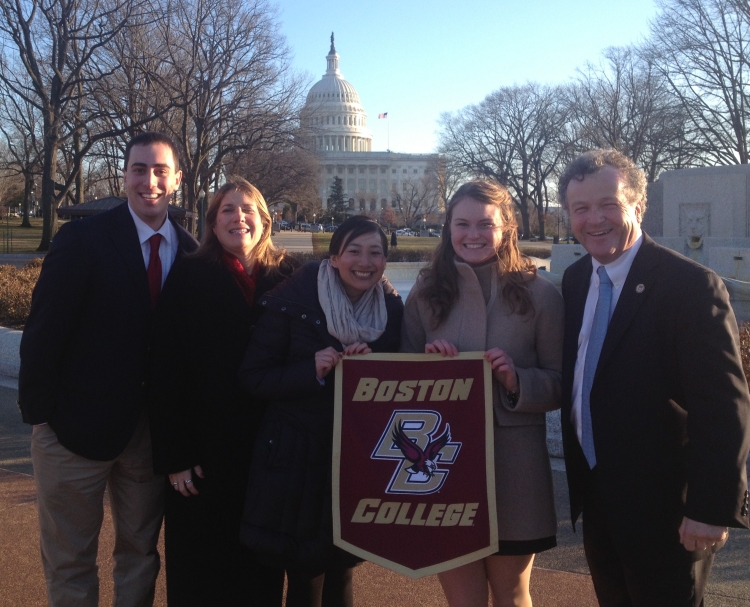
By
For many students, spring break involves a much-needed break from their academic workload and sometimes a tropical destination with friends. But Boston College seniors Elizabeth Zappala, Alexander Hoffarth and Jennifer Wanandi spent their week off with Congress on Capitol Hill, discussing the importance of federal student aid programs and research funding.
March 4 marked the first day of the inaugural ACC Educational Advocacy Day in Washington, DC, where Boston College and its fellow Atlantic Coast Conference member schools sought to bring a coordinated message to Congress on issues of importance to students and higher education.
For three students with political aspirations after graduation, this experience proved to be nothing short of eye-opening, especially at such a dynamic time for the federal government. They met with many prominent players in American politics, student leaders from several prominent universities, and were even given the opportunity to have a constituent coffee with US Sen. Elizabeth Warren (D-Mass.).
Washington was familiar territory to Zappala, who spent the last two summers as an intern with then-US Sen. John Kerry and the Democratic National Convention. On this visit, she and her two BC student colleagues hoped to communicate the need for Congress to maintain research funding levels from federal agencies, given how this influences students’ post-graduation plans.
“Research funding is an investment in the future, and there is no reason to sacrifice this investment for arbitrary cuts,” she said.
But the students quickly realized that in Washington there is more than one side to every issue, and nothing is as cut and dry as it seems.
“In regards to a rather simple issue of financial aid and research funding,” explained Hoffarth, “the Democrats and Republicans are approaching matters from what seems like two irreconcilable viewpoints. It is as if they cannot agree that ‘2+2=4,’ and I’m quite concerned about the progress this Congress will make on this issue, let alone immigration, gun control, and so on.”
After meeting with members of the Massachusetts congressional delegation’s staffs, each of the students were able to give personal appeals in the hopes of garnering attention for certain issues.
The students learned that lobbying involves more than the negative connotations that are usually associated with it, and learned how much knowledge of issues and the ability to effectively communicate are required to explain why a specific piece of legislature is important.
“By sharing our personal stories and how we and our friends would be impacted by the cuts to research funding and financial aid grants,” said Zappala, “we were able to effectively communicate how vital federal funding is to Boston College.”
Wanandi said, “Actually taking the time to meet with the members of Congress and their staffs helps to make a personal connection with all the issues that exist in our society.”
“As a political science major,” Hoffarth reflected, “I just found this to be a great culminating experience that united my interests in American politics, civic education, and leadership.”



